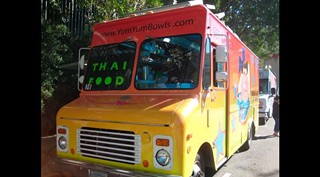Over the last few years, many urban gourmands have turned their attention from traditional restaurants toward a growing trend of pop–up restaurants, food trucks and other mobile establishments where entrepreneurs and foodies peddle their culinary creations.
In cities like Austin, Los Angeles, Portland, New York and Chicago, this new class of cooks, working from elaborately modified trailers and tricked out chuck wagons have become as engrained a part of local gastronomy as their forefathers, the ice cream truck and the hot dog cart.
The question asked with increasing frequency lately is “Why don’t we have any in Savannah?”
Like so many things in this town, the answer stirs up a pot of interested entrepreneurs, convoluted bureaucracy and peculiar policies. The good news is it might be getting better.
At a meeting last week in the Creative Coast office, more than 40 people showed up to take part in a conversation with Tom Vanderhorst, the City of Savannah’s Revenue Director, and Randolph Scott, the head of the City’s Zoning Department, both of whom play a crucial role in the permitting process for mobile vendors.
Vanderhorst, who moved to Savannah from Ohio six months ago to take over the position vacated by Buddy Clay, called the level of citizen interest in the issue “exciting.”
The turnout surprised Creative Coast Executive Director Jake Hodesh, who initially proposed the meeting expecting maybe a half dozen people.
“I wanted to see if the Creative Coast could help on a project like this,” he told us before the meeting. “Could we be a bridge between the entrepreneur community and the City?”
The answer seems to be yes.
The crowd included restaurant owners, entrepreneurs, a professor, an economist and people who were “just interested.”
The group asked questions, raised issues and attempted to clarify their understanding of laws governing food carts locally and at the state level.
“My understanding was that it was pretty much impossible,” says Brittney Blackshear, who is starting a business called Crepe–A–Diem. She was interested in having a food cart before finding out how difficult the process was. “I was going to go to the meeting and see what the progress is and what people are saying.”
The rules surrounding mobile vending in Savannah, particularly for food service, are confounding at best. There are specific areas where vendors can set up, myriad requirements for ownership, different sets of rules during festivals than during the rest of the year, regularly changing requirements from the health department, and a bevy of other considerations.
“Some of the ordinances we enforce aren’t that well written,” says Vanderhorst during the meeting. He’s had to learn the ropes of the local system since taking the job; the 2011 Revenue Ordinance for Savannah is 157 pages long, and that’s just the beginning.
In order to have a food cart in Savannah, the owner must secure the following: Sales tax ID from the state Department of Revenue, a permit from the state Department of Agriculture (for baked goods, seafood or certain other items), inspection and approval by the Health Department, verification from the City’s Zoning department that it’s a permissible use, a business tax certificate from the City Department of Revenue, and (depending on the location), approval from either the Parks Department, Leisure Services or the Traffic Department.
It’s this labyrinth of “competing bureaucracies,” as one potential vendor described it that makes getting clear information on the process so difficult.
The challenges don’t stop outside of government office buildings either. The cart must meet the physical dimensions defined by local ordinance, have a specific color umbrella (if an umbrella is present), and can only park “around” one of four squares (Johnson, Reynolds, Franklin and Wright), not in the square itself, or around other squares.
Carts are also allowed on streets around Forsyth Park, but not in the park (unless there’s a festival going on, and then only with special approval).
Also, there can’t be any on–site food prep – everything sold has to be pre–packaged and prepared in a kitchen approved by the health department and owned by the cart owner.
“The city doesn’t allow cooking on the truck,” explains Corey Houlihan, a co–founder of the Savannah Street Food Coalition, which has been seeking to rally support for food trucks and carts in Savannah via social media. “We would also have to have our own brick and mortar commercial kitchen that no one else could use, which defeats the food truck idea.”
No one is advocating a glut of lawless mobile food sellers working without regard for sanitation or safety, but the regulations are far from welcoming.
The City of Austin, Texas has hundreds of mobile food vendors, most of whom run officially sanctioned, tax–paying, job–creating businesses.
“It’s their livelihood,” says Sue Simons, the Supervisor of Environmental and Consumer Health with the Austin–Travis County Health Department.
Simons has worked closely with the city’s mobile food community to shape and revise the food code to balance safety and operability. Their combined efforts have made Austin’s rules a model for the rest of the country.
“I get called frequently,” says Simons. “I get calls from Washington DC to San Francisco asking about our mobile vendor program.”
To become a permitted vendor in Austin, owners of a mobile establishment must have the following: A notarized agreement letter with a health department sanctioned kitchen or preparation facility, a state tax ID, a fire inspection, an inspection of the mobile facility, and a plan to deal with waste (including waste water), among other requirements.
While many of the same regulations exist in Savannah, there are some crucial differences that are a hindrance to potential mobile food purveyors.
One incentive for food cart/truck owners is often the lower cost of a mobile establishment as compared to opening a brick and mortar restaurant.
Locally, mobile vendors must act as an extension of an existing restaurant. The owner of the cart must also be the owner of the restaurant, and, unless they are alongside a park or square, must own the property where the cart or truck is located.
“No mobile food service is allowed because it would compete with the restaurants who have invested in a physical static space,” explains Robyn Richardson, who presented a mobile vending concept during FastPitch, an event for entrepreneurs seeking venture capital that took place here earlier this year.
Requiring outdoor food vendors to be attached to a restaurant stemmed from a sudden increase in roadside grills several years ago, according to Randolph Scott, the City’s Zoning Administrator. “We couldn’t contain them,” he said during the meeting.
Scott was open to more food carts downtown, but warned that the City would err on the side of caution.
“We want this sort of business,” he told attendees, “but we have to protect the brick and mortar businesses too.”
There are some issues that need to be addressed before Savannahians might start enjoying more hot dog carts, mobile crepe stands and sno–cones, but the meeting at the Creative Coast represented a positive first step.
While business owners see potential profit in street food, the City has found financial incentives of its own. One potential solution to the declining revenue and increasing demand for maintenance and upkeep in the squares could be to rent or auction space for vendors.
“We could use these squares to generate revenue that would go back into the squares,” explained Vanderhorst, along with the caveat that any such plan was still a long way from being final.
The one thing that is certain is that there will be more meetings – both internally amongst City staff, and again with attendees, who agreed that a similar meeting with the Health Department would be the next logical step.






























